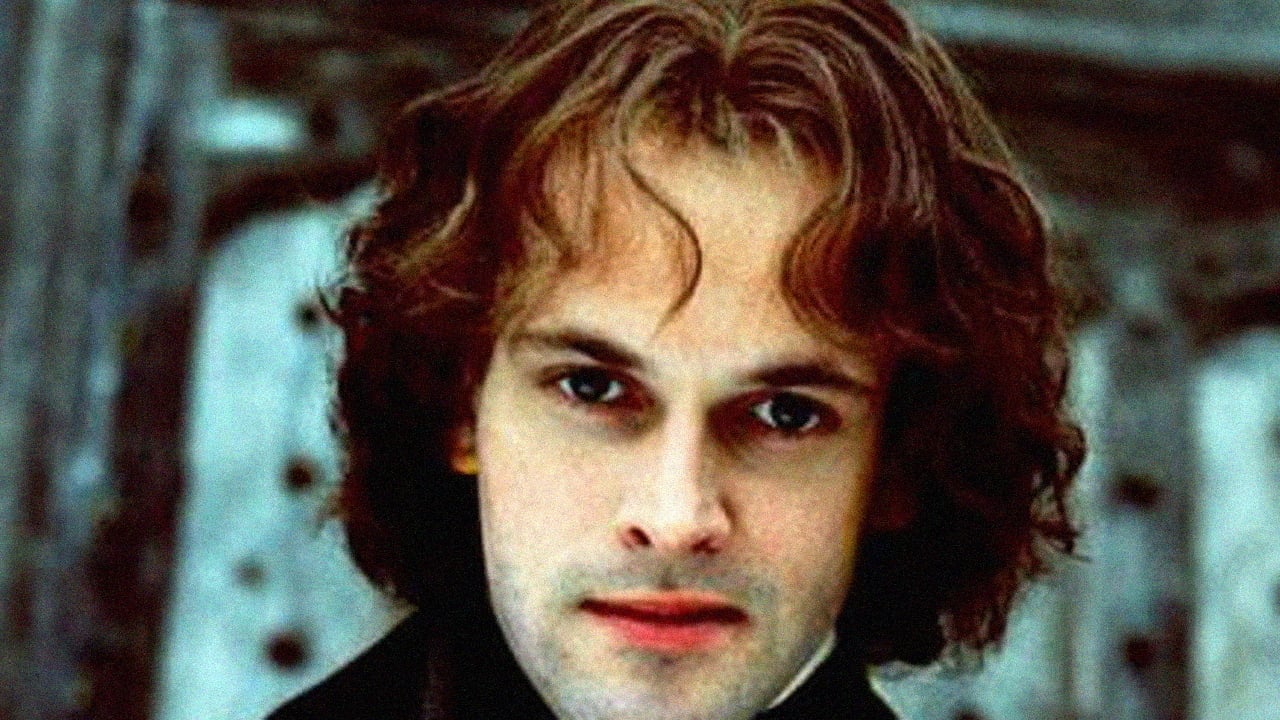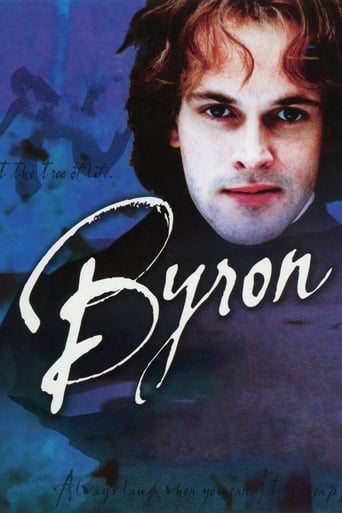

In the end how do you judge a man like George Gordon Byron? He certainly left a nice body of work to judge him as writer and poet. It might have been more had he spent a little more time at creation and less indulging every kind of vice there was. As he puts it so accurately pleasure is the only real reason we know we're alive.This film covers the period of 1812 to 1824 from the publication of Childe Harold's Pilgrimage until his death. He's quite the toast of Regency London and he's welcome by dint of his work and title in the best of homes. He soon wears out that welcome in a series of scandalous affairs. Regency society didn't mind affairs, but just be discreet. Discreet did not exist in his vocabulary.Byron's personal life is probably best known for his affair with Lady Caroline Lamb. But this film shows she's only one of many. Camilla Power plays her and Power is in the film long enough to show what a mad woman she was. A little too much for a lover and a husband to handle.I can't think of anything Byron missed. He made it with any woman who showed the slightest interest, even a little incest with a sister. He indulged himself in the love that dares not speak its name with a young boy. He drank to excess, took opiates at a rate that his contemporary Coleridge might have envied. There's brief scene of him turtling down some Laudanum like it was a brewski.I think he envied the Shelleys played here by Sally Hawkins and Oliver Dimsdale. Percy Bysshe Shelley and Mary Shelley were his contemporaries and they seemed to find happiness that was unattainable for Byron.Jonny Lee Miller plays the title role and makes Byron the last word in hedonism. He strikes just the right notes and pulls a lot of emotions from the viewer. You envy him and yet you're jealous of him. He's rich with a title which allows him to indulge. We'd all like to be him, but the business of day to day living leaves 95% of us with enough challenges for our lives.This BBC production of Byron is both revealing and non-judgmental. It will give you a good understanding of the man who in many ways was the symbol of the romantic age.
... View MoreThis BBC production on George Gordon Byron, 6th Baron Byron, isn't about the works of the renowned English poet and satirist, known widely as Lord Byron. Rather, its focus is on the life of the man. As such, it seems to do a very good job of showing a conflicted and tormented life that Byron lived. This is the story of a tortured soul who wrote about his own conflicts and failure to find fulfillment in pleasure. And it is about a witty, talented thinker and writer who could give us such classical satire as "Don Juan."I think a passage from the Encyclopedia Britannica describes well the varying views on Byron's place in letters. "Renowned as the 'gloomy egoist' of his autobiographical poem, "Childe Harold's Pilgrimage" (1812-18), in the 19th century, he is now more generally esteemed for the satiric realism of "Don Juan" (1819-24)." It was long ago that I read "Don Juan" and perhaps some small parts of other works or letters. So, I appreciated the review by Ginger Johnson (3 December 2005) who gave some information and points about the film as it depicted Byron's life. With the reviews I've read as of the time of my writing, I am surprised that no one has commented on Byron's background and upbringing. His is a classic tale (if, indeed, one can use the term in this context) of a broken home in childhood, with an abusive, negligent and then absent father. As a boy, he and his mother were a low-income family, and then at the age of 10 he had great wealth thrust upon him by inheritance. He grew up without discipline or responsibilities. He was extremely self- centered and selfish – what we might call "spoiled" today. Why is this worth pondering? Because, had he grown up in a healthy home with loving parents and some direction, there's a good chance that Bryon's life would not have been so tragic and short. And, we might have had the pleasure of more literary treasures today.The film covers mostly his last few years with his adultery, heavy drinking, and constant pursuits of pleasure amidst his travels. I agree that the acting was very good by all. The direction and technical aspects were all quite good. And, while it is a good depiction of the life of Lord Byron, I can't say that I enjoyed the film as entertainment. Nor could I enjoy watching it time and again, as one reviewer says he does. As reviewer Ginger Johnson noted, because Byron's life was "ill-spent," the film isn't a joy to watch. I can watch films about tragedies, injustices and other subjects that may be edifying or educational in some sense, but that often are not enjoyable entertainment. The life of Lord Byron was a tragedy. He died at 36, a tormented, conflicted soul, trying to help a cause he thought worthy. I think this film rightly does not celebrate Byron or his life. Rather, it laments the great loss for what might yet have been. Therein is the tragedy.
... View MoreI am appalled by some of the reviews on this movie. The people who take the time to criticize the film because they find Byron's personality inherently distasteful are no better than the stuck-up, vapid, and inherently depressed figures that also made up the aristocratic regency of England. Hypersensitive people like Lady Caroline or Byron merely reflect the madness and desperation festering within all of us, as well as the absolute solipsism. For one reviewer to find it important to tell us the movie was lusterless because Byron was a chaotic and dissolute fiend is about as productive as setting a leaf on fire and hoping the forest will catch. For your information, Byron was and is a hero to those who would dream. Don't take the opportunity to offer your privileged and sheltered scornful opinion on a legacy and film that have no time for such worthless peons of petulancy such as yourself. Yes he did things in his life that are considered horrible, but now he, and those he hurt, are no more than flakes of dust and dirt blowing around this world. Take time to focus on your menial existence rather than pompously proselytizing about others.Now that I am done putting down the insufferable philistines who found it fit to comment, I'll offer my own opinion on this movie. I adore this movie, and I make a habit of watching it at least once a month if I can. Sure it's choice of making an apex of Byron's life in England is blatantly wrong, and I thank the person who wrote that wonderful review mentioning how that choice is only a mark of the continuously conservative and scandal-obsessed society we live in today, but the aesthetics of the film remain intact. In fact, this biopic is perhaps the best I have seen in regards to its respect for the viewer's basic intelligence, wit, and sense of aesthetic. We are given the life of a man hounded by his own existence bar none. My favorite scenes were the ones between Byron and Augusta, though I would have liked to have seen Shelley get a larger role and have Keats ridiculed by Byron as well (that middle-class masturbator, to paraphrase Byron).Please, if your mind is as sufficiently petty as benbrae76 (who wrote that god-awful review), don't bother commenting. Or even better, take a cue from Fanny Imlay (Mary Shelley's half-sister) and kill yourself.
... View MoreI've always been enthusiastic about period dramas, an art form in which the BBC has excelled in the past. This presentation of "Byron" was unbelievable. Unbelievably bad! The script was dreadful, the acting uninspired, and all the characters woefully insipid. Apparently Byron was "mad bad and dangerous to know", and set the ladies hearts all-a-flutter. Not in this production. Here he appeared as a tawdry jumped-up little squirt instead of a passionate hero of womenfolk and the catalyst for the Greek struggle for independence. Being born with a club-foot Byron walked with a limp. This portrayal of the man was just limp all over.Byron was in reality an arrogant, cruel, egocentric, sexual (actually bisexual) predator, and although handsome and obviously attractive to women, in my opinion a generally loathsome creature who thought nothing of the tears of others he abandoned, both the women who loved him and whom he mostly abused, and his children. He has been dubbed by some as the ultimate romantic. I find nothing remotely romantic about him. He led a debauched, drunken, chaotic life in the mode of many modern-day pop and film "stars", who have equally misguided beliefs of their own importance, of being do-gooders and/or of being some sort of fighter for the underdog. I haven't much time for those similarly irresponsible idiots either. Byron didn't even see any heroic action in Greece, but died a distinctly nasty unheroic death there, caused mainly by incompetent doctors, and I for one think he deserved it. However somehow he became a catalyst for future action for Greek independence. Lord knows why or how! Thankfully Byron's early death spared us of more of his dreary, hypocritical, and over-revered poetry, and probably saved more women of ignoble treatment at his hands. I watched the whole two and a half-hours waiting for the production of "Byron" to spark into life. Not a splutter, not even a glimmer. It was utter tedium, if not downright boredom, from start to finish. In my opinion Byron's works should be flung on the back burner, and this dramatisation of his life should be accorded the same treatment. However I do realise I'll probably be in the minority with my opinions. C'est la vie! I think the BBC lost its nous with this one. Although I detest the man and his works, with a little more effort and research, the production team could have brought him to life, but they didn't even come close to showing the deplorable excuse for a man that was the real Byron.
... View More